|
EFT on BBC Midlands Today Programme – Transcript Courtesy of Jacqui Footman 14/01/2014
-- Transcript Begins --
Open on News Desk.
Anchor: Patients with depression or psychosis are benefiting from a therapy called Emotional Freedom Technique. It involves tapping with fingers on acupuncture pressure points whilst giving a positive message. Early results are encouraging. Here’s our Health Correspondent, Michele Paduano.
Cut to visual with Professor Tony Stewart tapping.
Professor Tony Stewart, Staffordshire University: The anxiety I’m feeling (repeated by client), the corner of your eye now, the anxiety in my shoulder (repeated by client).
Reporter: Tony Stewart is a specialist in Public Health but he became interested in tapping and persuaded doctors in Sandwell to pilot the technique. He found all but one of his 36 patients got better.
Professor Tony Stewart: What we found was that on average at the start, people were showing us clinical cases and at the end on average they were showing as normal on a range of things.
Cut to visual of patient playing classical guitar with music in background.
Reporter: Patients like Mark Willetts, a classical guitarist, who has suffered with anxiety and depression for years; it was even affecting his ability to perform.
Mark Willetts, EFT Patient: Anyone with stress or depression can be a very difficult person to be around and maybe a slightly unpredictable person to be around. And it certainly, as a result of lightening my mood, I think lightens the mood in the entire house, so both professionally and personally I did feel tremendous benefit from it.
Cut to visual of doctor interacting with receptionist in GP surgery.
Reporter: Doctors in Sandwell who sanctioned the research have developed the scheme, training another 20 therapists.
Dr Ian Walton, Sandwell Clinical Commissioning Group: I was really very cynical, but he proved me wrong! I don’t understand how tapping your acupuncture lines can make you feel calm and better, but it seems to work for patients. Some of them very ill patients!
Cut to visual of Professor Tony Stewart tapping with the reporter.
Reporter: As well as acupuncture, it seems to work through positive thinking and perhaps mild hypnosis. I think if felt more like hypnosis, really, than anything else. It was quite a strange feeling, but it was relaxing. This process is quite easy to teach people and it is also very effective – it seems to work on patients who have as few as 5 sessions.
Cut to patient playing guitar.
Reporter: With demand for mental health services increasing and finances tight, it could strike a chord with those who pay for care. Michele Paduano, BBC Midlands Today in Tipton.
Cut to News Desk.
Anchor: Isn’t that interesting! Dan’s here with tonight’s sport...
-- Transcript Ends --
About Prof Tony Stewart
Tony is a Professor in Public Health, currently working at Staffordshire University. He also practices as an NHS Consultant in Public Health. He is a published author and won a prestigious BMA award in 2011.
As well as his EFT and Matrix Reimprinting practice, Tony is a clinical hypnotherapist, having trained in Clinical Hypnotherapy and NLP with The British Society of Clinical and Academic Hypnosis (BSCAH). He regularly attends Continuing Professional Development seminars and tutorials.
He has extensive experience as a Clinical Researcher, with expertise in Epidemiology and Evidence-Based Medicine. As well as practicing these therapies, Tony also carries out and publishes clinical research into their effectiveness and trains therapists to practice them. Tony and his colleagues published the first clinical study of a dedicated EFT service within the NHS and the first ever clinical study of Matrix Reimprinting.
Tony's breadth of experience gives him a specialist insight into the work of the NHS and academia, on which he has based his research into EFT in clinical settings. He is highly professional, and his training brings the credibility of practice in the field.
Tony aims to make his training open and accessible, providing a great service that people feel comfortable with. His programmes are enhanced with insights and demonstrations that bring the topics to life. With a strong focus on participants, Tony aims for every course to be tailored to the particular needs and interests of those taking part, and aims always to offer added value for the time invested.
Both his therapy and training sessions take place in a relaxed, supportive and non-judgmental environment.
In addition to his professional life, Tony is a keen broadcaster, presenting radio programmes as diverse as classical and smooth jazz.
About The AMT
The GoE is a non-profit organisation dedicated to modern energy work, including EFT Emotional Freedom Techniques. Since we were founded in 1998, our mission has to be provide high-quality professional trainings and to also keep a register of fully-qualified members we recommend to members of the public.
French Translation
We are pleased to provide a French language translation of the transcript, courtesy of Maria Annell.
Traduction française Maria Annell 16/01/2014
-- Début transcription --
Présentateur: Des patients en dépression ou souffrant d’une psychose peuvent bénéficier d’une thérapie appelée “Emotional Freedom Techniques”, Techniques de Liberté Emotionnelle en français (ndt). Cela consiste à stimuler des points d’acupression avec ses doigts, pendant qu’on récite un message positif. Les premiers résultats sont encourageants. Voici notre correspondant Santé, Michele Paduano.
(Coupe montrant Professeur Tony Stewart faisant de l’EFT)
Professeur Tony Stewart, Université de Staffordshire: L’anxiété que je ressens (répété par le client), au coin de l’oeil maintenant, cette anxiété dans mon épaule (répété par le client).
Reporter: Tony Stewart est un spécialiste dans la Santé Publique, et il s’est intéressé à l’EFT. Il a convaincu des médecins à Sandwell d’essayer l’approche. Il a trouvé que tous sauf un de ses 36 patients ont eu une amélioration.
Professeur Tony Stewart: Ce que nous avons trouvé, c’est qu’au début [de l’étude ndt] les patients présentaient un tableau clinique, et à la fin, des résultats dans les normes admis pour plusieurs paramètres.
(Coupe montrant un patient qui joue de la guitare, qu’on entend)
Reporter: Des patients comme Mark Willetts, guitariste classique, qui souffrait de troubles d’anxiété et de dépression depuis des années, qui l’empêchaient même d’exercer son métier.
Mark Willetts, patient EFT: Quiconque souffre de stress ou de dépression peut devenir très pénible pour son entourage, et peut-être légèrement imprévisible pour les proches. Et c’est sûr que, parce que mon humeur s’est allégée, toute la famille s’est trouvée soulagée. Je dirais que j’en ai tiré d’énormes bénéfices [de l’EFT ndt] aussi bien sur le plan professionnel que personnel.
(Coupe sur un médecin en interaction avec une réceptionniste en chirurgie)
Reporter: Les médecins à Sandwell qui ont sanctionné l’étude ont développé le modèle, formant 20 autres thérapeutes.
Dr Ian Walton, Commission Clinique à Sandwell: J’étais très sceptique, mais il [Tony Stewart, ndt] m’a prouvé le contraire ! Je ne comprends pas comment tapoter des lignes de méridien peut vous apaiser et amener des améliorations, mais apparemment, ça fonctionne pour les patients. Parfois des patients très malades !
(Coupe sur le professeur Tony Stewart qui tapote avec le reporter)
Reporter: Il y a de l’acupuncture, mais aussi de la pensée positive, et peut-être de l’hypnose léger. Pour moi, ça ressemble surtout au ressenti avec l’hypnose, en fait. Une sensation assez étrange, mais c’est relaxant. La méthode est facile à enseigner aux personnes, et c’est très efficace – il semble que les patients vont mieux après seulement 5 séances.
(Coupe sur patient à la guitare)
Reporter: Avec une demande croissante de soins en santé mentale et des finances serrées, cette pratique pourrait bien intéresser ceux qui financent les soins. Michel Paduano, BBC Midlands Today in Tipton. (Retour studio)
Présentateur: Comme c’est intéressant! Et maintenant, le sport...
-- Fin transcription –
German Translation
German translation provided by GoE trainer Detlev Tesch:
|

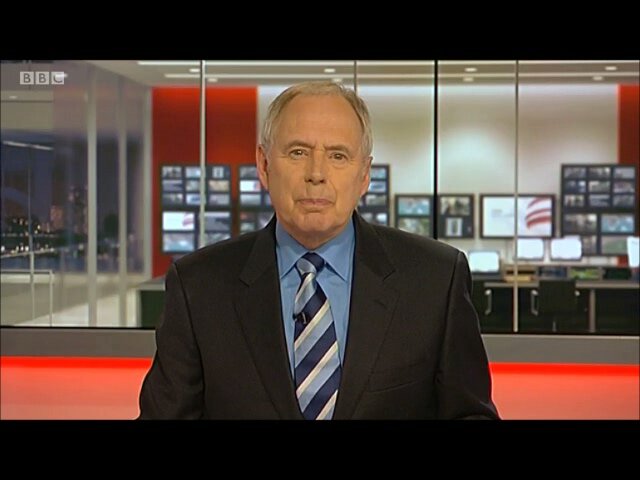
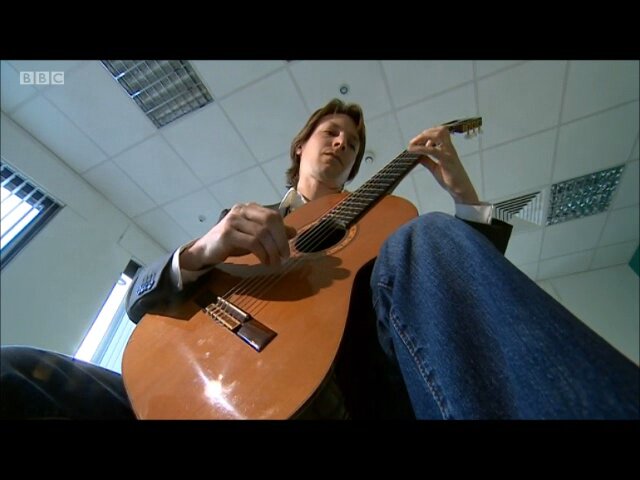
.JPG)
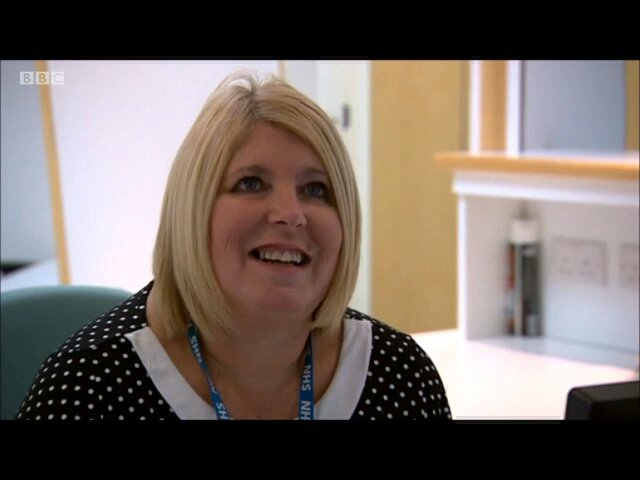
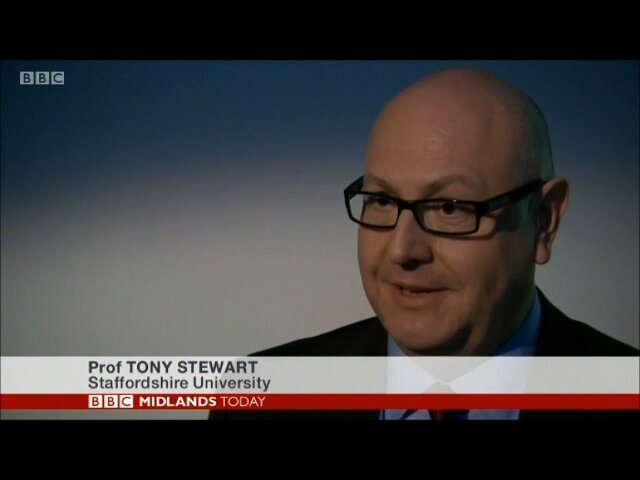
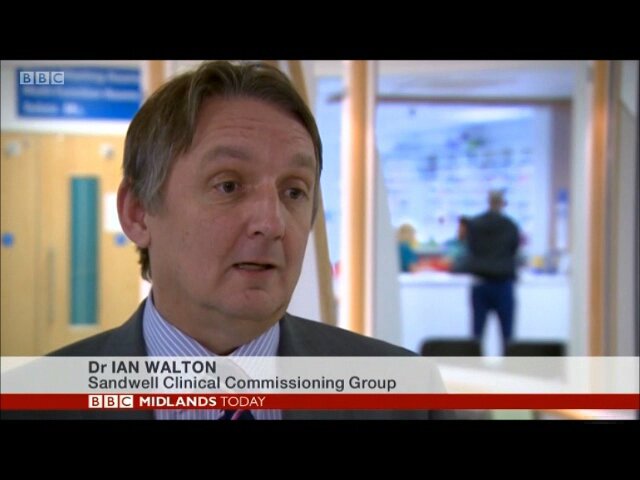
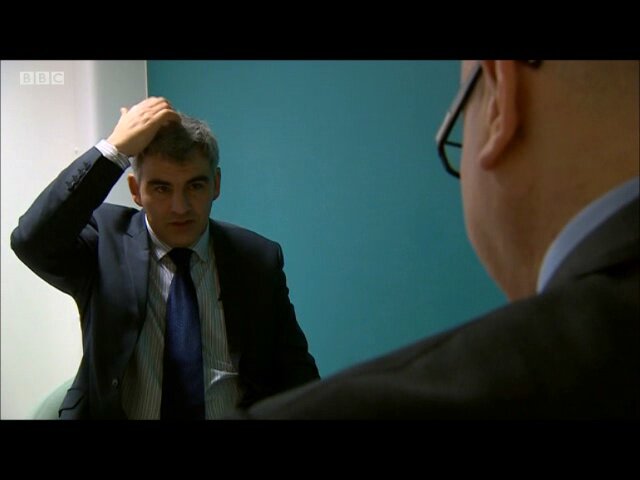 |
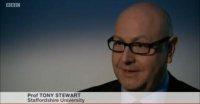

 Home
Home
